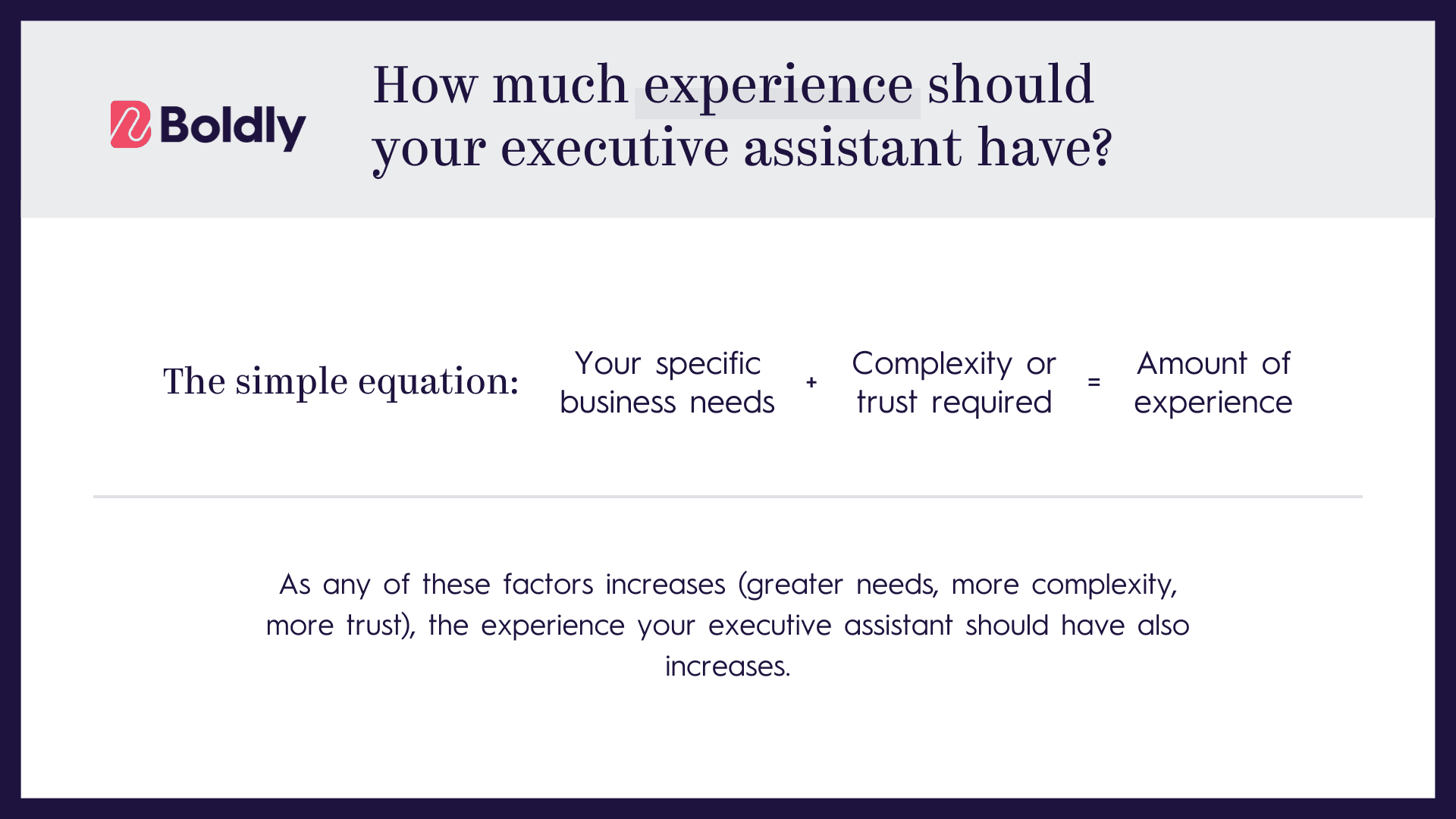It’s easy to assume that more experience is better, but the punchline is that you’re better off defining what you need from an assistant before you jump straight to years of experience.
After all, if you only need someone to format reports for you, hiring an assistant with 10 years of experience just doesn’t make sense! And vice-versa — if you’re a leader looking for a strategic partner, you’re going to want an assistant who has done similar work before, maybe even in the same industry.
So what kind of an assistant should you look for? How much experience should you pay for?
The question of how much experience your assistant should have depends entirely on your specific needs and the complexity of tasks you’ll be delegating.


A startup founder managing basic administrative tasks has very different requirements from a Fortune 500 CEO who needs strategic partnership and high-level decision support.
What Counts As A Lot Of Experience For An Executive Assistant?
After a decade of hiring high-level executive assistants here at Boldly, we’ve found that 7+ years tends to be the tipping point between an assistant who is able to complete a task list and an assistant who can supercharge your productivity.
The latter is the kind of support that leaders, executives, and enterprise companies really benefit from to allow their teams to focus on what they do best – which often isn’t admin work!
It’s important to note that it’s not just about the numbers – you’ll want to make sure that the type of executive assistant experience matches what you’re looking for. The quality and relevance of their background matter just as much as the duration.
For example, an assistant with 7 years of event planning on their resume might not be the ideal candidate if you need help managing your inbox.
That’s why we spend an extraordinary amount of time screening applications at Boldly to make sure all of our team members have varied, premium-level experience – and then we go the extra mile to personally match them with clients that are best suited to their strengths and working styles.
Of course, not everyone needs to invest in a highly experienced, business-grade executive assistant. In fact, many solopreneurs and entrepreneurs with huge to-do lists can benefit from an assistant with 2-3 years of experience.
How Assistant Experience Affects Your Onboarding Investment
Let’s talk about time — not just yours, but the time for an assistant to feel confident and trustworthy in their role.
The experience level of a new assistant significantly affects your onboarding timeline and investment.
Less experienced assistants may require 3-6 months to fully understand your preferences and business needs, while seasoned professionals often hit the ground running within 2-4 weeks. Factor this learning curve into your hiring decision and budget planning.
The Hidden Cost of Your Time
Here’s something most executives don’t think about when hiring an assistant: your own time investment.
Every hour you spend training is an hour you’re not spending on work that actually moves your business forward. The best practice? Either delegate the training to someone else on your team, or hire an assistant who won’t need extensive training.
What to Expect Based on Experience Level
- Entry-level assistants typically need more structured onboarding and often take 3+ months to reach full effectiveness. You’ll spend significant time explaining your processes, communication style, and providing ongoing feedback.
- Experienced premium assistants adapt much faster and can provide meaningful support within weeks. They pick up on your patterns quickly, can improve your existing processes, and ask smart questions that speed up their learning curve.
Why Traditional Hiring Requires More Investment
Traditional hiring takes an average of 44 days just to fill the role – before any training even starts. Subscription-based services like Boldly can have a matched and onboarded EA within about 10 days, thanks to pre-vetted, experienced professionals with established systems already in place.
The Bottom Line
Investing in assistant experience upfront will save you time, energy, and frustration down the road. Whether you go traditional or use a subscription model, protecting your time during onboarding should be a key factor in your hiring decision.
When You Don’t Need An Experienced EA
The difference between a virtual assistant and an executive assistant can be summed up as tasks vs. trust.
Not everyone needs the most highly experienced and most expensive executive assistant. A virtual assistant may serve your needs better.
What does a virtual assistant do?
Virtual assistants are more task-oriented. That is, you delegate tasks for them to do, and that’s their sole focus.
That might include:
- Data entry
- Maintaining a spreadsheet
- Research
- Updating customer records
- Basic clerical or admin support
Because a virtual assistant is task-driven, they don’t need a full understanding of the inner workings of your business. They just need to be prompt at completing tasks.
Pooled virtual assistants are a popular option for those needing virtual assistants. You provide them with your tasks, and whoever is next available completes the task and gets it back to you. They don’t know you or your business but focus on getting things done and helping whoever is next in line.
While these tasks are important because they would otherwise eat up your time if you were doing them, they don’t require the extensive experience an executive assistant has.
What does a remote executive assistant do?
Remote executive assistants are more integrated into everything you do, and trust in your executive assistant is a big component. We often say that growing businesses move at the speed of trust, and it’s true.
Remote executive assistants are more strategic and support high-level executives and leaders by:
- Using access to email, bank accounts, and passwords to accomplish tasks
- Arranging complex travel plans and meetings
- Managing your calendar effectively
- Handling confidential or proprietary information
- Communicating with clients and team members on your behalf
- Representing you to clients and partners
- Helping with project management, which may involve decision-making
- Knowing a lot about both your business and personal life
How To Get A Highly Experienced Executive Assistant Without The Hiring
A remote executive assistant will be a greater investment than a virtual assistant, and for good reason. Their extensive experience in working in the C-Suite has led to the development of “soft skills” that are required when the work is beyond simply checking off a task.
We also recommend hiring your executive assistant as a W2 employee — it’s worth the investment to avoid issues with compliance.
The good news is that you can get the benefits of a highly experienced executive assistant in a more budget-friendly manner by using Boldly. Our remote executive assistants are available to you on a subscription as fractional support, working for you remotely only for the time you need.




